
By Chris Spiker From Daily Voice
For the first time in years, the obesity rate is falling in the US, with the rise of weight loss injections like Ozempic and Wegovy driving the change.
Gallup released its latest National Health and Well-Being Index on Tuesday, Oct. 28. The research and polling firm found that the adult obesity rate has dropped to 37.0% in 2025 after hitting a record 39.9% in 2022.
That decrease translates to roughly 7.6 million fewer obese adults nationwide. Despite the drop, the US obesity rate remains among the highest in the Western world.
At the same time, the number of people using GLP-1 injectables like semaglutide for weight loss has more than doubled. Gallup found that 12.4% of adults now use these medications, up from 5.8% in early 2024.
Women are leading the trend, with 15.2% reporting use of the drugs compared to 9.7% of men. Both groups have more than doubled their usage in the past year as awareness of the medications rose from 80% to 89% nationwide.
Obesity rates have declined across most age groups, particularly among adults aged 40 to 64, the same age group reporting the highest GLP-1 use. Those aged 40 to 49 saw their obesity rate fall 4.3 points since 2022 to 43.3%, while adults 50 to 64 experienced a five-point drop to 42.8%.
Despite the weight loss progress, Gallup found that diabetes diagnoses have reached an all-time high of 13.8%, showing that the chronic condition often lingers even as obesity rates improve.
"The growing popularity of GLP-1s has led to healthier [body mass index] scores but has not lessened the rate of diabetes diagnoses, which is a lifetime diagnosis," said Gallup. "Only if the rate of new diabetes cases starts to decline will the US rate eventually follow."
Semaglutide was approved for weight loss in 2021 and has since become one of the most widely recognized medications in the US. Thirteen states now fully cover GLP-1 treatments for obesity through Medicaid, with more considering similar legislation.
Gallup researchers also said that while the new drugs have helped lower obesity, they aren't a substitute for healthier diet and exercise habits.
"Sustained health progress will likely depend not only on medical innovation but also on rebuilding healthier daily routines that complement pharmacological treatments," Gallup said.
Gallup surveyed 16,946 adults online in the first nine months of 2025.

 Daily Voice
Daily Voice
 America News
America News Raw Story
Raw Story Reuters US Politics
Reuters US Politics 5 On Your Side Sports
5 On Your Side Sports